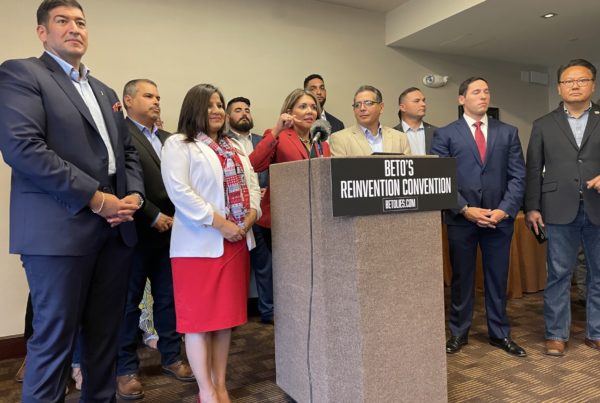Under growing pressure from members of his own party to take a tougher stand in the wake of the Dobbs decision overturning Roe v. Wade, President Joe Biden on Monday issued important guidance for hospitals that apply even in states where abortion is illegal. The Department of Health and Human Services instructed hospitals that federal law requires doctors to perform abortions for pregnant people who show up in their emergency rooms if they believe the procedure is, “the stabilizing treatment necessary” to resolve an emergency medical condition.
On Thursday, Texas Attorney General Ken Paxton filed suit against the Biden administration, accusing the president of “flagrantly disregarding the legislative and democratic process and flouting the Supreme Court’s ruling before the ink is dry.”
This is happening amid a growing conversation among doctors here in Texas and way beyond about when the procedure might be permitted as emergency care. Seema Mohapatra is the M.D. Anderson Endowed Professor in health law at Southern Methodist University in Dallas.
The guidance issued by the Biden administration was to clarify Emergency Medical Treatment and Active Labor Act, or EMTALA. This law to any emergency room accepting federal funding. If a patient comes into the emergency room with an emergency condition that requires an abortion to stabilize the condition, EMTALA would trump state law. Listen to the interview above or read the transcript below.
This transcript has been edited lightly for clarity:
Texas Standard: What was the purpose and intention of the Biden administration’s guidance here?
Seema Mohapatra: So the Biden administration’s guidance was just to clarify that EMTALA, which is kind of known as the patient anti-dumping law, applies to any emergency room that accepts any kind of federal funding. And if somebody comes in to the emergency room with an emergency condition that requires an abortion to stabilize that condition, that EMTALA would trump state law. It doesn’t in any way change any federal law. It doesn’t change policy. It was merely a clarification by the Department of Health and Human Services that if a hospital determines that there is an emergency condition and that the emergency condition can only be stabilized by an abortion – for example, an ectopic pregnancy – then that hospital would have to perform that, even if it violates state law.
But Texas’ own law allows for exceptions when an abortion would save the pregnant patient’s life or prevent ‘substantial impairment of major bodily function.’ Isn’t that pretty consistent with federal guidance issued Monday or is there some difference there?
So Texas’ exception for emergency treatment is a bit narrower than the federal requirement under EMTALA. However, they are quite similar. The complaint, though, that is filed by the attorney general seems to kind of mix up the two requirements of EMTALA, which are, one is to have a nondiscriminatory screening requirement and then stabilization.
And it seems that the attorney general’s complaint kind of confuses some of the jurisprudence on the screening requirement versus the stabilization requirement under the stabilization requirement, it’s always been federal law that you cannot dump a patient before they are stabilized. And the definition of stabilization is that they were not going to be made worse if the hospital discharges them. And so in this situation, if you have a pregnant person come in, and an emergency situation, the hospital has done a screening exam, determined that it’s an emergency situation. And if under the physician’s diagnosis, an abortion is what is needed in order to stabilize the patient, that should be done. And I gave the example of an ectopic pregnancy. But there could be other situations where a health care provider might feel that this is necessary. And so Texas is arguing that their state law trumps federal law. However, it has long been established that EMTALA is the anti-patient dumping law that applies to any hospital that takes any kind of federal funding.
What does this do for doctors who are faced with having to make important decisions right now?
Texas already has, as you mentioned, an exception to its abortion laws, that if there is a life threatening emergency that requires an abortion, an abortion can be performed. And so, as a practical matter, nothing has changed. All the guidance did from the Department of Health and Human Services is note that if you are at a hospital where you need to have an abortion in order to stabilize your medical condition, you should be able to do that regardless of whether the state law is otherwise in Texas, the state law is not otherwise. That would be consistent with the state law.
I guess my question is, does this have a chilling effect If you have a challenge to federal guidance and the courts have yet to to weigh in on this?
I think that is part of the purpose of this kind of lawsuit, frankly –to have a chilling effect and to cause confusion around what is the proper way to act. And any kind of delay in terms of in an emergency situation can threaten the lives of pregnant people that might need abortion care. And I think that’s part of the plan for this; is to kind of make doctors question and wait and get guidance on whether they can proceed or not, even though this has been the law for a long time.















